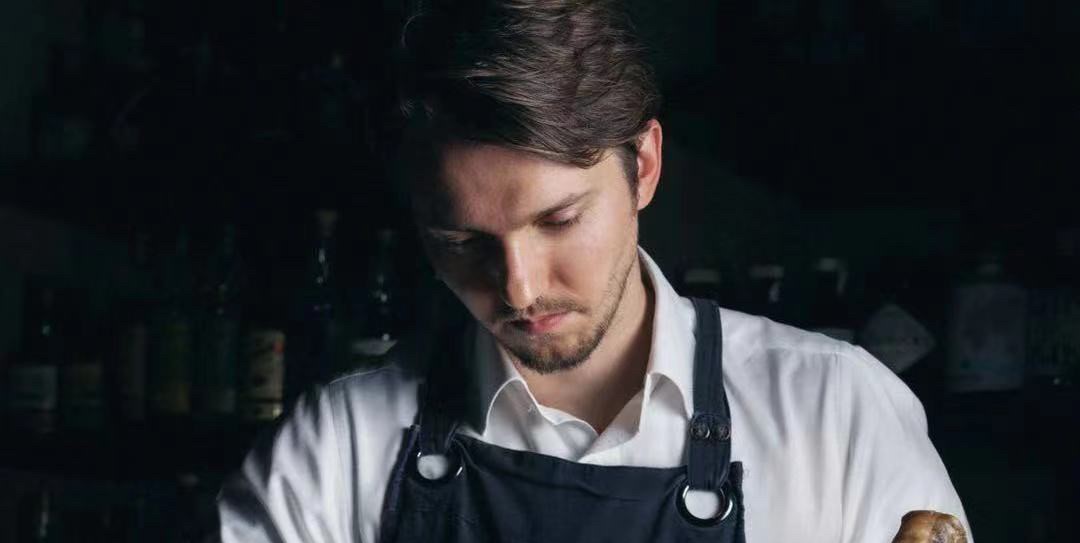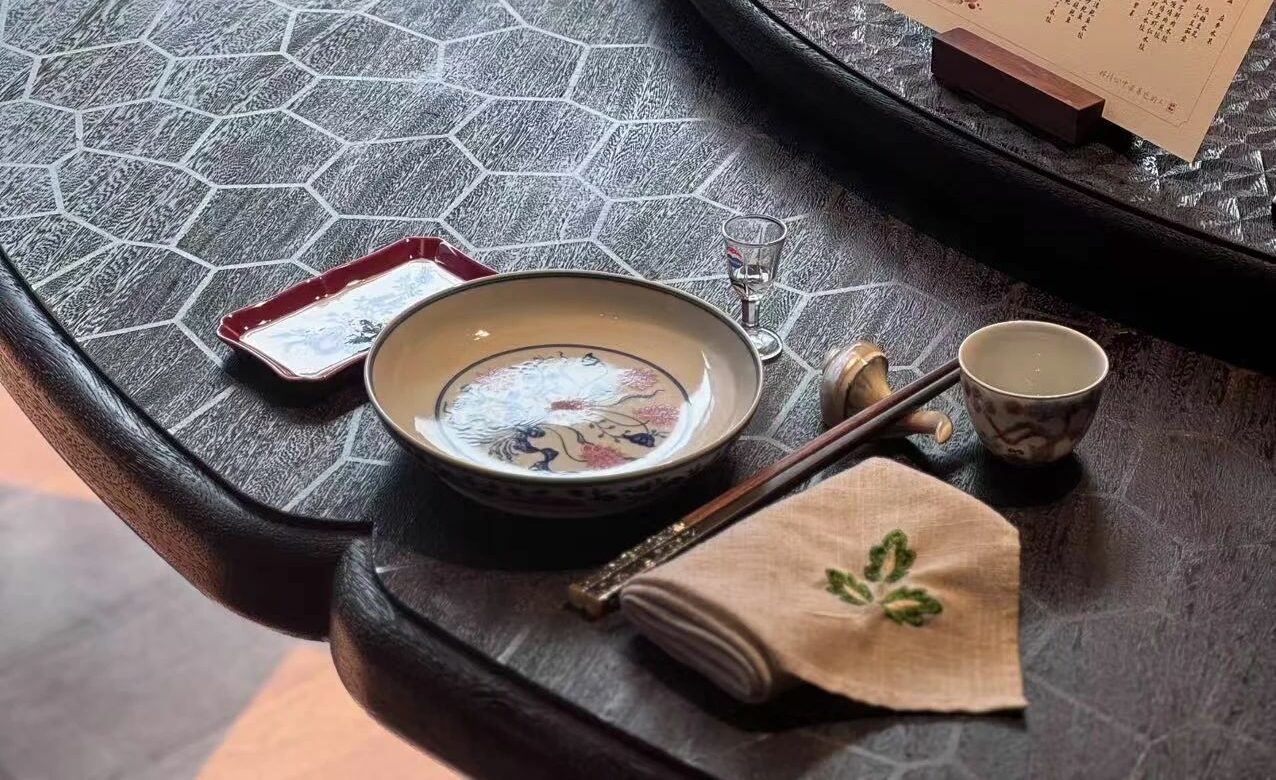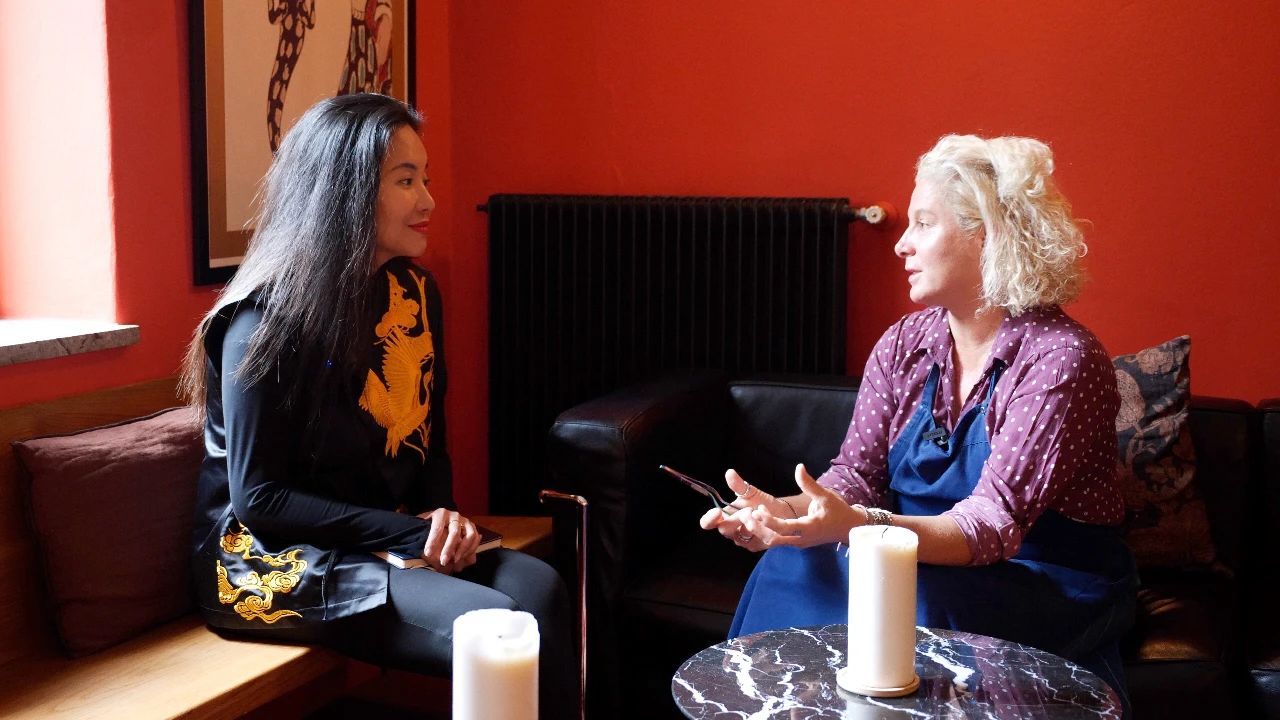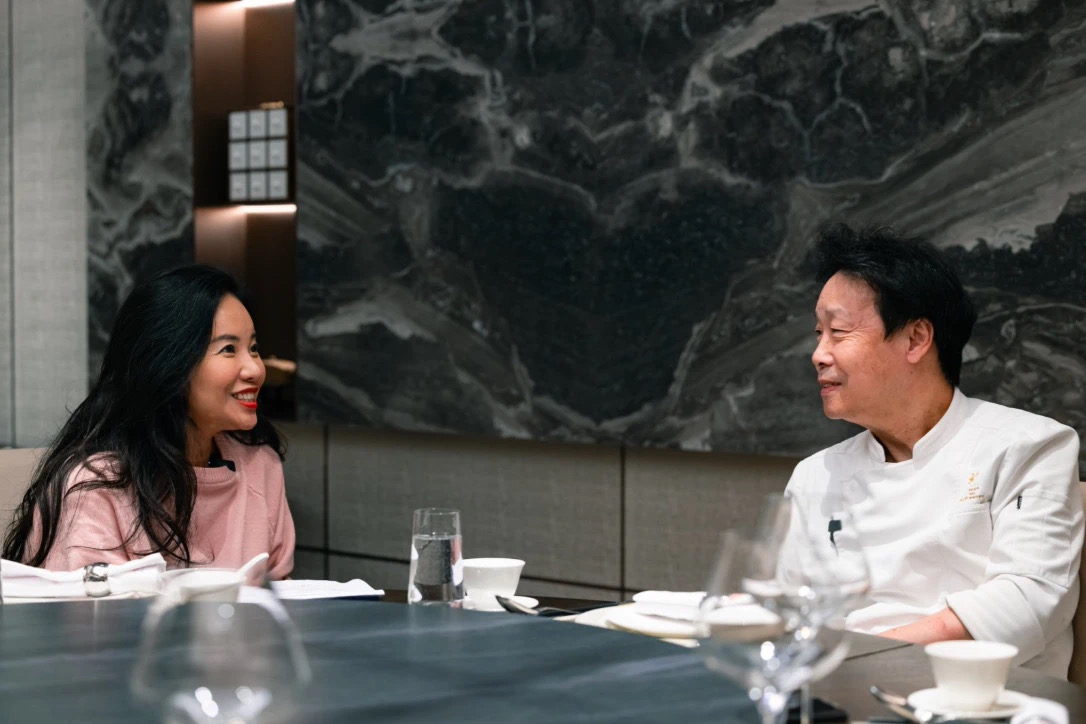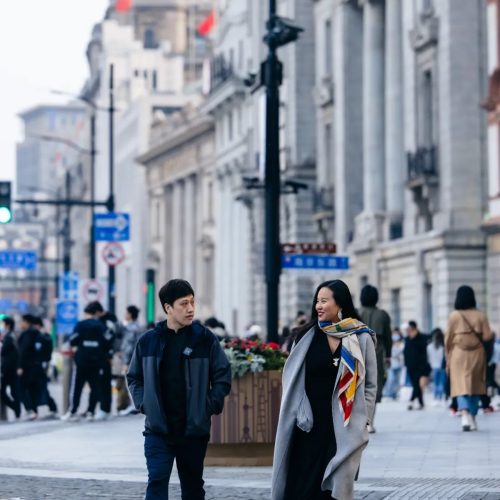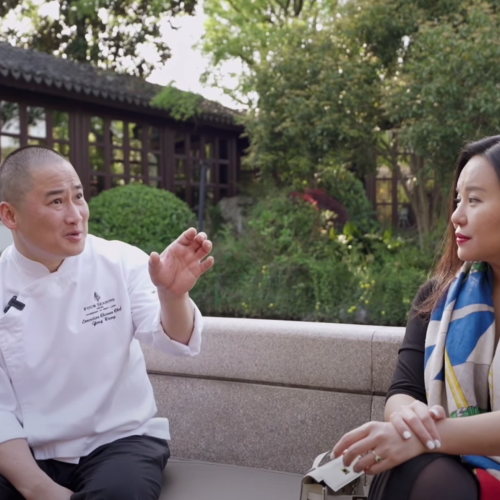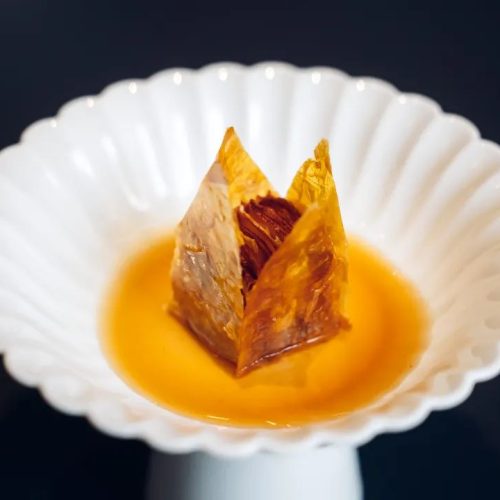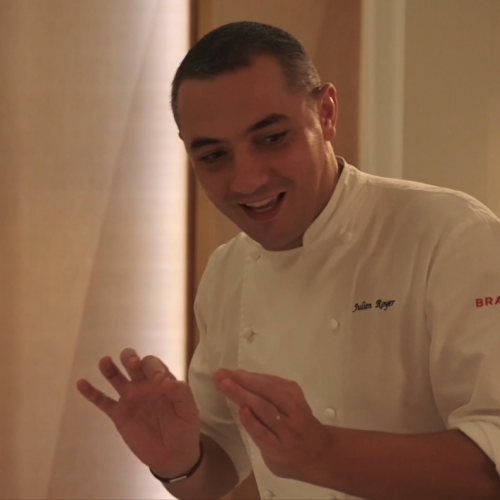Now this is one of the most incredible dining scenes you could possibly conceive: perched on the top floor of the Futian Shangri-La that’s high enough to overlook the buzzing city center of Shenzhen, and a view expansive enough to look out at the magnificent mountainous landscape, the restaurant is equipped with a five-million-yuan sun-kissed kitchen and a professional team of young chefs full of energy and good vibes. This is one of the top-flight kitchens I have seen in the country. The kitchen is said to be designed in accordance with it’s Napa Valley counterpart, perhaps just a little more petite in size.

Kitchen
Ensue’s Head Chef Miles Pundsack-Poe has a particularly young face, a face with no experience.


Chef Miles Pundsack-Poe
Shenzhen could attribute the flourishment of fine dining restaurants over the past two years largely to Ensue, a high-end venture with the aura of its Californian Michelin three-starred veins. Two years ago, I had the privilege of participating in the preparatory process for Ensue’s opening, thus I have always had a special feeling for Ensue. With its rapid progress, the restaurant has emerged to exceed beyond Shenzhen, but the whole mainland, to become one of the new heights for Western fine dining destination. His widely creative and avant-garde approach to his dishes remains true to his ‘hippie’ life experience, almost full of adventures much like the tales in The Alchemistby Brazilian author Paulo Coelho.
Two years ago, much attention was attracted when Christopher Kostow, who had earned three Michelin stars for his Napa Valley restaurant, The Restaurant at Meadowood, went east to the Southern city of Shenzhen, where there’s not much in the way of high end Western cuisine. Ensue is designed to blend elements of Chinese luxury with the natural beauty of the Napa Valley, especially the heavily invested high-rise kitchen which features windows with abundant sunlight and the friendly working environment where staffis treated as well as its customers. The restaurant is funded by Ricky Li, a young entrepreneur and perfectionist with unwavering persistence in taste and detail. You will find some seriously expensive food containers in the restaurant. Twenty-thousand-yuan for an ice bucket?



Environment
The menu at Ensue pays respect to the local products but reveals openness and creativity thanks to the head chef Miles Pundsack-Poe.
Miles is one of the best students of Christopher Kostow. They shared the same cooking philosophy–valuing the natural world.
Past few times dining at Ensue had never failed my expectation, rather, it was getting better each time since the first few months after its opening. My appetite has only increased, what dishes would be there waiting for me today?


Culinary crossover of Ensue and chef Tam Kwok Fung
Left: Ensue chef Miles Pundsack-Poe; Right: chef Tam Kwok Fung
Miles’s cuisine is innovative and progressive, much like the name of the restaurant–‘Ensue’, implying constant motion and continuation, and gives me new experience every time.
One dish was the Lardo with Cuttlefish. The idea was from steamed vermicelli roll. Local cuttlefish and sheets of preserved lardo are cut into thin slices and combined with whelk torchon to add crispness. It is then sous vide Shengzhou yellow wine lees for a week to absorb the winery flavour as the alcohol gradually evaporates during the marinating process. This is a common method to make cold dishes in Jiangsu and Zhejiang provinces. The cashew sauce, made from cuttlefish stock, raw cashews and roasted cashew milk, is then poured over atop to bring out yellow wine’s unique fragrance with its warmth and moisture. The rich content of starch in cashews thickens the sauce, giving it a strong nutty flavour together with the seafood umami. The cashew sauce plays a critical role in making the dish more impactful and more layered in its texture. The finely sliced cuttlefish is enhanced by the addition of lardo in terms of luxuriant plumpness, which for me, is far more indulgent than steamed vermicelli roll. Beware of its highly addictive combination of flavourful sauce and textured mouthfeel.
Miles talked about a kind of ‘visual texture’ that he was pursuing. This is a new concept for me. The whelk torchon and cuttlefish are both cooked under precise temperature control, full of personal touch and yet with an elegant style.
Another dish was the BBQ Spiny Lobster with Congee. The spiny lobster from South China Sea is brushed with last year’s hairy crab garum and Lushan Wild Honey to quickly lock the juice inside the lobster under the charcoal up to 1000 °C. The surface of the lobster is slightly caramelized, and heated barbecue skewers are used for grilling to ensure that the lobster is fully cooked to the center.
Pickled spring snow peach from Hebei province is used to balance the sweetness and acidity, and also the crispness. Lobster meat is firm and bouncy with well-balanced and remarkably delicate flavours. The freshness and delightful umami of the seafood is wonderfully coupled with multi-grain congee, bit of Chaoshan style and sufficiently satiates my Asian palate.
This time again, I opted for Ensue’s signature dish, Chicken Bake in Sourdough as its 2.0 version. 120 days Qingyuan chicken is baked in sourdough, allowing the chicken to be cooked by the heat and moisture inside the bread (sauna chicken). Ensue originally used sunflower chicken in the 1.0 version, but the supplier had undergone difficulty maintaining the quality of their chicken since the breakout of the pandemic, so Ensue has not provided the dish for some time until Qingyuan chicken was found. Strictly speaking, chicken aged 120 days are no longer spring chicken, but they enjoy tender meat and smooth skin with body weight controlled under 600 grams, about the size of a pigeon.
Conch is filled between the chicken skin and the meat. Sous chef Sean told me that the dish had now upgraded to the 3.0 version, the sauce intensified by incorporating the taste of Chinese-style steamed herbal chicken. Very much looking forward to it.
Braised baby turnip comes in every day freshly from the restaurant’s organic farm. The lingering sweetness and flavourful juice of the turnip blast in the mouth to form a classic oriental symphony with the soft-tender and incredibly smooth chicken. This dish is also one of Miles’s favourites, as he enjoys baking bread, and he is pleasantly surprised for the stable quality of locally sourced Qingyuan chicken.
Dessert was the Smoked Coconut with Baby Mango Bavarois, which is modern and packed with tropical pleasure. Instead of directly cracking open, the whole coconut is roasted on fire to build up the slightly layered smoky taste inside out. Then the smoked coconut is made into ice cream and jelly and served with baby mango from Hainan. It reminds me of Etxebarri’s smoked ice cream, downright simple yet heavenly delicious.

Texture of Land & Sea


BBQ Spiny Lobster+Congee


Chicken Bake in Sourdough

Wagyu Short-Rib | Asparagus | Egg Yolk Sauce

Smoked Coconut | Baby Mango Bavarois
Dining at Ensue has always been relaxing and heart-soothing. You don’t have to know where exactly you are heading, and you just let your taste buds guide you.
Ensue’s dishes are sophisticated in a way that’s hard to associate them with such a young chef. Miles approaches his dishes with balanced seasoning but his creations are bold, mature, yet with a sense of elegance and vulnerability. The elaborate dish presentation is not Rococo ornamentation, but a style of wildness and freedom. Miles’s futuristic aesthetic is formed partly because of his continuous sampling of the regional cuisines these two years and also his idiosyncratic life experience.
Born and raised in Canada, and was raised with a passion for travel and cuisine. Growing up, Miles and his family travelled frequently and spent time living in locations such as the Caribbean, Europe, and South America. He recalled experiencing a range of cultural shocks during the year he spent living in the Dominican Republic. Later he moved with his parents to Ecuador in South America.
During his travels in Central and South America, experience eating guinea pigs and frogs ignited his interest in food and taught him what it really means to love and respect our food. And he was only ten years old at that time. Childhood memories create our being and purpose, making us who we are as adults. He said that because of his young age, the fear and excitement of trying out new things had formed intense, vivid memories that have stuck with him since then. Seeing the food culture of Central and South America has also prompted him to think about what has made North America cuisine unique.
He moved with his parents to Austria but later returned to Canada to complete high school. Where, he joined an organic agriculture program began to cook for people. He soon found out that cooking is his lifetime pursuit because he likes bringing people happiness with his dishes. Then he acquired a chef certification from Canada, and decided to live on a farm for a year to get a hands-on experience of the farm-to-table rituals. Farm-to-tableis amodern eating trend getting increasingly popular, but he saw the value in it early on, that is, connecting people to what they have in the plates. During the year on the farm, he was inspired by a mentor, which helped him better understand what it means to live a true, sustainable life.

Chef Miles Pundsack-Poe
Miles is undoubtedly a worshiper of nature and he attributes it to his Canadian background, a country that boasts camping in great wilderness and cooking around the fire. Inspired by this, Ensue’s dishes offer pure aesthetic and are unencumbered by formality.
The influence from family, the education on collaboration, the experience of community building, organic farming and art, all came down to form his artistic perception since early ages. Together with a strong interest in cooking, they have laid a solid foundation for his professional path.
When asked why he opted for fine dining, he said that there is a lot more to play with in this genre of cuisine because the researching process comes with higher costs, which must be supported by higher prices.
That year on the farm reconnected him to his childhood memories and made him realise that cooking was where he really wanted to be heading. The Michelin dream gradually comes into being as he got to know more industry influencers and developed ambition to reach further.
Miles wanted to work at Michelin restaurants but there were none in Canada. He later worked at Eigensinn Farm, a Pellegrino World’s Best Restaurant, as Chef de Partie. One year later, Miles joined the team at Langdon Hall as the Tournant Saucier and Baker, expanding his knowledge of fine dining restaurants.
Talking about experience at the time, he commented that farm-to-table is just a marketing gimmick. For example, Langdon Hall did have a farm, but the produce which the restaurant claimed to have sourced from the farm was only enough to serve a few VIPs. He mentioned that people may not be fully aware of the relationship between farm size and land productivity. For instance, to supply for a set menu of 10-12 dishes for 60 people in one evening requires much more land than a picturesque restaurant farm. That’s just math. He also pointed out that claims of locally sourced products that were not, and relationships with local producers that did not exist were common among crowded markets.
The Willowa Inn, a restaurant on Lummi Island in the US, was once a Washington landmark for its isolated location, attracting visitors worldwide. The restaurant boasts of only using locally sourcing items from the island to assure freshness and quality, but the left staff revealed that they often bought ingredients from supermarkets. The situation in China may be just as disappointing.
Miles’s love of freedom and interest in travel brought him to Madrid, Spain where he completed the ICEX Training Program in Spanish Gastronomy and was the only Canadian candidate to secure the scholarship. When asked why he chose Spain, he said that the country had distinctive culinary culture and Spain was pioneering the high-end dining experience in the world during the El Bulli era, and the second reason was the free flight tickets.
The biggest thing Miles noticed about Spanish cuisine is that there is a huge emphasis on freshness, regional dishes and most of all, seafood and produce, one example being the steaming of freshly harvested cockles from the sea. This gave him a deeper understanding of the local food culture. In addition, he could see the joys of eating in Spanish tapas bars, a good Gin Tonic in a well-chosen stemware, white wine on the rocks… Food are more than just food here–they’re a social activity meant to be enjoyed in great company. He was touched by the kind of food and services that strive to create good times and precious memories.
After studying traditional Spanish cuisine, he performed internships at one Michelin starred Nerua for three months. The restaurant inside the Bilbao Guggenheim Museum offers a wonderful dining ambience, but according to Miles, “Nerua’s food is inspired by art, but it’s very simple, just a fish and a splash of sauce in front of the customer, and that’s all.”
El Bulliis a ground-breaking restaurant that has created dishes and revolutionary techniques that sparked many copycats. Once he went to attend Madrid Fusion, an event that brings together celebrity chefs, local produce and food culture, usually consisting over 60 culinary shows, 20 workshops and cooking competitions. It is a one-stop event to appreciate culinary skills of chefs from around the world. He was excited and developed interest in molecular cooking techniques. However, after a period of practice in molecular cuisine, he became skeptical of this science of ‘overcooking’ and felt that perhaps the best way of enjoying food is respecting the intrinsic natural flavours of themselves.

Having given up internship at Mugaritz, he worked at the highly regarded grill restaurant in the mountains of Atxondo–Asador Etxebarri. The food was by all means delicious, but most of which are grilled over an open hearth. He learned that sourcing the ingredients did require a large input of time and effort but what he was really expecting to see was the spark in the kitchen.
Miles’s Michelin dream didn’t stop there. Later, he got options between two Michelin three-starred restaurants and eventually moved to California and joined the culinary team at The Restaurant at Meadowood in Napa Valley, mostly because he sees the restaurant as having real connection with nature and farmland, also because California is way too beautiful to resist. At the age of 22, he worked at The Restaurant at Meadowood. After being a sous chef for two years, he stayed for another two years. Although he returned to Canada for personal reasons, also he said he needed to take a break from the 16-hour workdays at the restaurant. He said it’s a shame that he left because Kostow told him later that The Restaurant at Meadowood adjusted work schedule so that staff no longer had to work for such a long time every day.
Miles assisted with the opening of Chef Kostow’s newer restaurant The Charter Oak before he left so the two chefs have maintained a strong friendship.
After leaving California for about a year, he catered for Hong Kong Jockey Club in 2018 at the invitation of The Restaurant at Meadowood as he was eager to learn Asian cooking techniques. He had barely heard of Shenzhen before, assuming it was very similar to its neighbouring Hong Kong, but later found out that they are two very different worlds. Before the pandemic, he would go to Hong Kong for dining once every two weeks.



NAPA Valley
We talked about new-NAPA cuisine, which Miles sees as a California farm-to-table culture that pays respect to the organic concept, freshness and local produce rather than a clear-cut framework. In fact, the culinary concept has already travelled to other parts of the world. California is the leading producer of domestic avocados in the US and home to about 90 percent of the nation’s crop. Today, the world has seen demand for avocado skyrocketing together with people’s emphasis on natural, simple and healthy foods.
Shouldering the responsibility in leading the way forward through sustainable farm-to-table agriculture, Ensue is proud to offer modern cooking with global approach. Miles’s ‘borderless’ dishes incorporate a wide range of Chinese ingredients, including beef, vegetables and seafood. Throughout the seasonally changing menu at Ensue, almost everything the restaurant needs can be found in China. Unlike the massive use of Western ingredients adopted by many Chinese restaurants, Miles’s insistence on the use of local ingredients is something that even Chinese restaurant can barely vouch for.
Traveling has broadened his perspective. He said doing trips in China has helped him appreciate regional food culture and their tastes, and he particularly thanked Chengdu for cultivating an impressive array of wonderful flavours. According to Miles, designing seasonal menu is like drawing a gastronomic map of China, but the purity of Cantonese cuisine is slightly more favourable to his preference.
Apart from learning preservation method of fermenting, he also mentioned the difficulties in making mooncakes last year, which was a total ‘disaster’, according to Miles. But in all fairness, Ensue’s Cantonese mooncakes last year were some of the most memorable mooncakes I have ever tasted in my life. The mooncake is made with a super short shelf life to preserve the original flavour of the ingredients. Who would have thought the naturally sweet, effortlessly velvety and very Chinese lotus seed mooncakes are the work of a Western chef?
When asked about the difficulties he encountered working in China, he said first was the language and second, a lagging behind in driving the creative process among local chefs. To turn zero into one is not something easy to accomplish, so he hopes Ensue can be a place to inspire the next generation of chefs. It may sound condescending to say so for such a young man, but his early experience in the culinary world does have a saying in this. Miles may be forthright, but he is an unpretentious gentleman.





For Miles, ‘Less is more’ is his cooking philosophy where ingredient is at the heart of everything. He believes not to overcook ingredients is an important task for some chefs. Miles’s idea is this: a simple vegetable that he grows from the farm can, in its purest form, hold a remarkable flavour that beats the world’s best caviar and foie gras.
Some would define Ensue’s dishes as modern Cantonese cuisine. Miles is happy with it because he doesn’t like the word ‘fusion’. He has been working with naturalism, minimalism, and honouring local ingredients in their best ways. But of course Ensue’s dishes are modernized with an international approach, inheriting general concepts of The Restaurant at Meadowood and incorporating Californian reverence for nature’s organic treasures. Other inspirations during the design of the menu include hometown dishes of his co-workers in the kitchen.
Interest in travel and food has brought Miles to China. Having established a family in Shenzhen, he found tremendous sense of security and belonging in this megalopolis of 17 million population. He even joked, ‘Maybe this is where I’ll live for the rest of my life, because it’s the safest place ever.’ The decision to move to China was made easier by the early experience working away from home and had nothing to hold him back.
He said one day he would like to open a restaurant kind of like the Faviken concept. He values the connection between land and people, and he finds it inconceivable that many people don’t seem to care much about where the food they eat comes from.
He is full of expectation for the future of the vibrant Southern city of Shenzhen, which will be shaped by the influx of elites and talents from all over China. He believes Shenzhen has received a lot of attention by international investments and business ventures in the past two years and there will be more in the future.
The first few months before Ensue’s opening were not easy, and Miles was surprised by how quick ‘Chinese speed’ is in construction work. The traditional market is a new experience as he devoted himself sourcing and researching ingredients during the process. Meanwhile, he realised that Shenzhen is growing at a pace that the food culture seems to have failed to keep up with. Life was a bit depressing when moving to another country alone, said Miles, but he met his current partner who shares his views on vegetables and sustainable farming, which has helped him find balance in work and life.
Ensue’s ambitions are big, but not grandiose: setting up new heights for the best Western-style restaurant in China, and encouraging Shenzhen’s younger generation of entrepreneurs to bring the city’s fine dining experience to the next level. Ensue is a beginning, and it wouldn’t be too much of an exaggeration to compare its status to that of Noma in Copenhagen. Sometimes success is not all about how much money is invested, it’s about what you are truly capable of.
Ensue is the kind of restaurant where I want to sit back and relax for a few hours, and where I can revisit what it really means to love and respect our food. For a Michelin-level gastronomic journey, look no further than Ensue.
Ensue
📍4088 Yi Tian Road, Futian District, Shenzhen, Floor 40 (Futian Shangri-La Hotel)
⏰Tues-Sat 5:30 PM-9:00 PM
☎ Tel: +86 188-2343-7333
🏷Web: http://www.ensue-sz.com/



